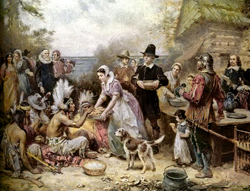For mere vengeance I would do nothing. This nation is too great to look for more revenge. But for security of the future, I would do everything.
~ James A. Garfield (wiki) (speech, 15 April 1865, on the occasion of President Lincoln's assassination)
Nobody but radicals have ever accomplished anything in a great crisis. Conservatives have their place in the piping times of peace, but in emergencies, only rugged issue men amount to much.
~ Garfield (statement in his diary for 1876)
I am trying to do two things: dare to be a radical and not be a fool, which, if I may judge by the exhibitions around me, is a matter of no small difficulty.
~ Garfield (letter to Burke A. Hinsdale, 11 January 1867)
The divorce between the church and the state ought to be absolute; It ought to be so absolute that no church anywhere in any State or in the nation should be exempt from equal taxation; for if you exempt the property of any church organization, to that extent you impose a church tax on the whole community.
~ Garfield (in the House of Representatives, 22 June 1874)
Garfield died of a gunshot wound, from a disgruntled office-seeker, that today would probably not be life threatening. They just couldn't find the bullet and get it out. Alexander Graham Bell's attempt to locate it electronically, with the first metal-detector, failed, confused by the metal bed springs. Sadly, within ten years, the discovery of X-rays would provide a technology that could have made finding the bullet easy, even routine. With no antibiotics to control the infection, Garfield lingered painfully for more than two months.
~ Kelley L. Ross (b. 1949) (The Great Republic: Presidents and States of the United States)
He did not flash forth as a meteor; he rose with measured and stately step over rough paths and through years of rugged work. He earned his passage to every preferment. He was tried and tested at every step in his pathway of progress. He produced his passport at every gateway to opportunity and glory. His broad and benevolent nature made him the friend of all mankind.
~ William McKinley (1843-1901)* (eulogy on the unveiling of a statue of President Garfield, 19 January 1896)
November 19 is the anniversary of the birth of James A(bram) Garfield (1831-1881), 20th President of these United States, in Moreland Hills, Ohio. Born to a widowed farm wife, Garfield worked at a series of menial jobs but eventually attended Williams College, graduating in 1856.
He entered politics as a Republican and served in the Ohio State Senate until the outbreak of the Civil War, in which he saw combat as a Union major general. In 1862 he was elected to the U.S. House of Representatives and served in that body until 1880, after 1876 as Republican Leader of the House.
Noted as a skilled orator, Garfield supported the more radical aspects of Reconstruction, but later moderated his views and became known for his strong support in Congress for the gold standard and free trade. He narrowly escaped involvement in the Crédit Mobilier scandal of 1872, but his stature was such that the Republican party nominated him in 1880 as a compromise candidate for the Presidency, which he won handily. His four-month administration, characterized by party squabbles over federal jobs and political patronage, was cut short by his fatal wounding by a disappointed office-seeker in Washington in July 1881:
On July 2, 1881, at 9:20 a.m., James A. Garfield was shot in the back as he walked with Secretary of State Blaine in Washington's Baltimore and Potomac train station. The proud President was preparing to leave for Williams College—he planned to introduce his two sons to his alma mater. The shots came from a .44 British Bulldog, which the assassin, Charles J. Guiteau, had purchased specifically because he thought it would look impressive in a museum. Garfield's doctors were unable to remove the bullet, which was lodged in the President's pancreas. On September 19, 1881, the President died of blood poisoning and complications from the shooting in his hospital rooms at Elberon, a village on the New Jersey shore, where his wife lay ill with malaria.
From a CBS interview with Candice Millard, author of Destiny of the Republic: A Tale of Madness, Medicine and the Murder of a President:
The shot in the back was not fatal, not hitting any vital organs. The bullet lodged behind the pancreas.
"If they had just left him alone he almost certainly would have survived," Millard said. Within minutes, doctors converged on the fallen president, using their fingers to poke and prod his open wounds. "Twelve different doctors inserted unsterilized fingers and instruments in Garfield's back probing for this bullet," Millard recounted, "and the first examination took place on the train station floor. I mean, you can't imagine a more germ-infested environment."
He died two and a half months later and was succeeded in office by Vice-President Chester A. Arthur.
* N.B. Ironically, President McKinley was the next president to be assassinated - in September 1901.
A brief documentary:


